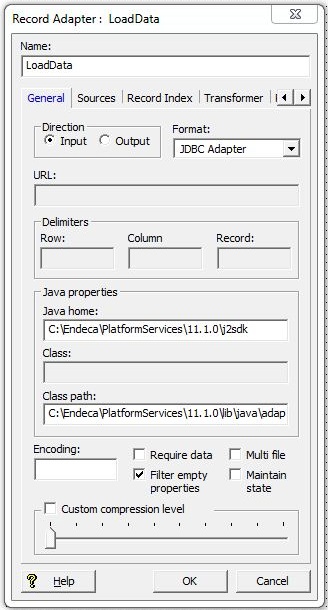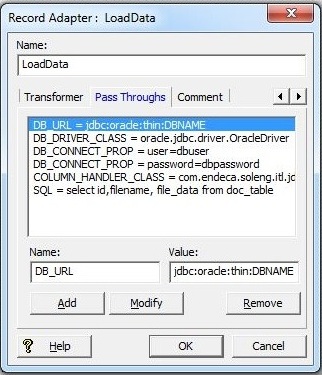Create a JDBC record adapter as usual, with PASS_THROUGH values like DB_DRIVER_CLASS, DB_URL, and SQL. See the JDBC section in Developer Studio Help for information about how to create a JDBC record adapter.
The following is an example of Record Adapter in Developer Studio:
Java home must be set as $ENDECA_ROOT\j2sdk
The class path must contain paths to:
Add one new PASS_THROUGH with name COLUMN_HANDLER_CLASS and value
com.endeca.soleng.itl.jdbc.AdvancedJDBCColumnHandler.
The following is an example of a complete JDBC record adapter with this
additional pass through:
Whether
Forge is run on the command line or from a control script, the
adapter.jar file must be added to the
--javaClasspath argument. Also, if the
columnHandler.properties configuration file will be
used to override any default options the directory containing the
columnHandler.properties needs to be added to the
--javaClasspath argument as well. The following example
illustrate the use of this argument when Forge is run from the command line:
forge --javaClasspath /path/to/adapter.jar:/path/to/JDBCDriver.jar:/path/to/propsfile_directory /path/to/Pipeline.epx
If your project requires additional JAR files, such as those required by the JDBC driver, be sure to include those references as well. Also note that Unix systems use a colon to delimit multiple JARs, while Windows uses a semicolon. For information about how to set the classpath, refer to Developer Studio Help.
Note
Instead of specifying clear text credentials, you can use Oracle Credentials Store (OCS) to specify database credentials information. In which case instead of specifying the username and password information along with DB_URL or DB_CONNECT_PROP, you need to use the passthrough CREDENTIALS_KEY and provide the key name that should be used to retrieve the credentials from Oracle Credentials Store. For information about how to use the OCS, refer to the Oracle Commerce Guided Search Security Guide.



